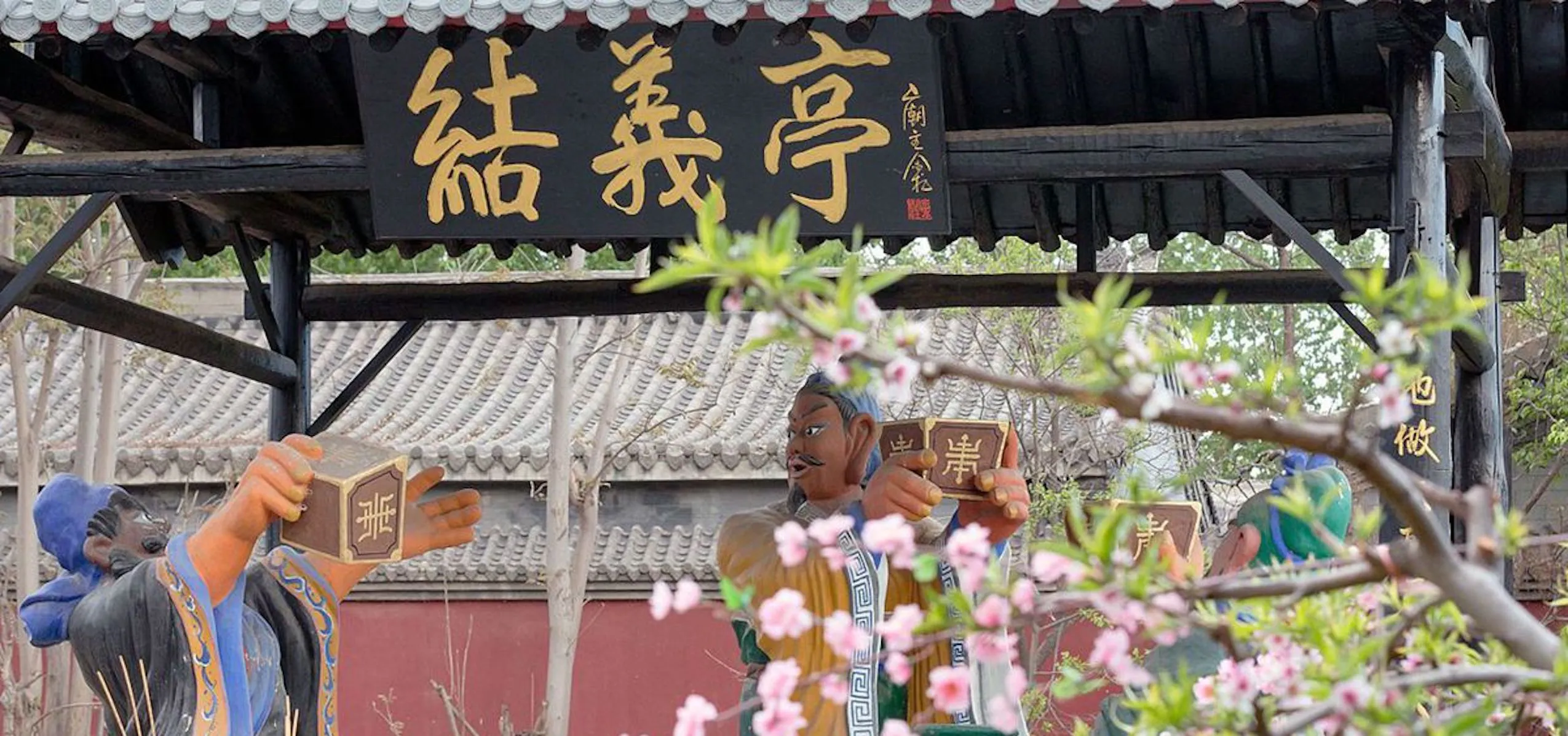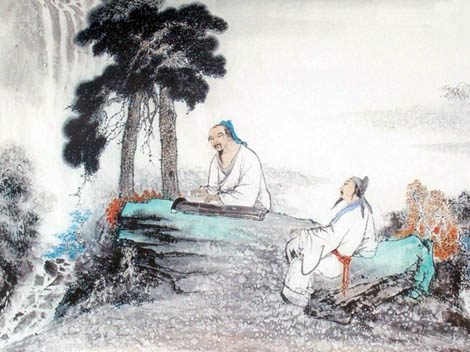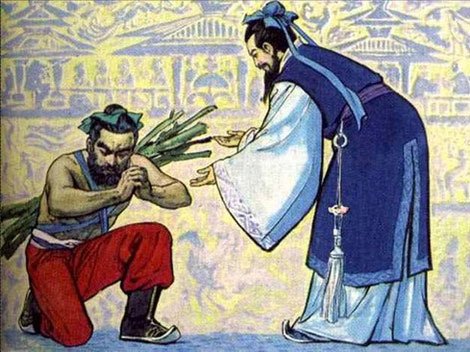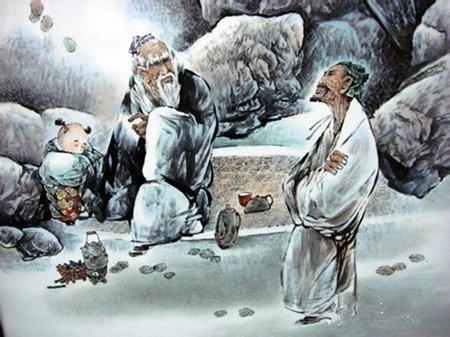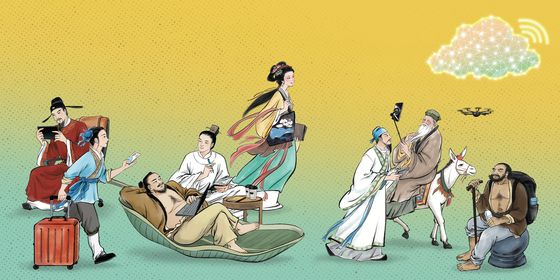Why do Chinese people bow down eight times when swearing to be brothers?
Ancient China may not have had social media, but if close friends from Chinese history had posted any photos of themselves in hanging out and helping each another, they probably have hashtagged it "eight-bow friends (八拜之交)" —the 12th century equivalent of #FriendshipGoals.
Appearing first in the Shaoshi Wenjian Lu (《邵氏闻见录》) by scholar Shao Bowen (邵伯温) in 1132, the term “eight-bow friends” refers to sworn brothers (or sisters) in Chinese history. According to Master Shao, when two bosom friends swear to be brothers or sisters for life, they need to bow down eight times, and to worship eight pairs of great friends in history and legend, who are respected as ideal models for true friendship. Here are stories of those eight undying friendships:
Friendship of soul mates 知音之交
Friendship of soul mates, or literally “friendship of those who understand the sounds (知音之交),” originates from the story of a guqin master Yu Boya (俞伯牙), in the Spring and Autumn Period (722 BC – 481 BC), and Zhong Ziqi (钟子期), his woodcutter friend. They became friends because Zhong could always understand what Yu was trying to express through his music. When they first met, Yu was playing a piece conveying the magnificence of high mountains. Zhong passed by and acclaimed “Solemn and magnificent, just like Mountain Tai lofty in the cloudy sky!” Yu was so surprised and glad that he invited Zhong to listen to another piece, depicting the waves of rushing water. Again, after Yu finished, Zhong said “How surging and vast the water is! Just like the tempestuous river!” They became bosom friends, and another four-character idiom (chengyu) inspired by this story, “high mountains and flowing water (高山流水),” also describes the friendship between soul mates.
After Zhong died, Yu went to his tomb and played the last piece of music for him and smashed his guqin, never to play again for the rest of his life. Since Chinese people highly value spiritual understanding between friends, the story of high mountains and flowing water spread down for thousands of years.
Throat-cutting friends 刎颈之交
The idiom “throat-cutting friends” came from Records of the Grand Historian (《 史记》) by Sima Qian (司马迁) of the Han dynasty (206 BCE – 220 CE), referring to friends who are willing to die for each other. However, the story behind it had no mention of throat cutting.
Lin Xiangru (蔺相如) and Lian Po (廉颇) were both officials of the State of Zhao in the Warring States Period (475 – 221 BC). After scoring a series of diplomatic victories as an envoy to the State of Qin, the strongest state and a bully at that time, Lin was promoted to a position higher than Lian, who was the highest military officer. Lian was very dissatisfied. He complained in private that “All Lin did was wag his tongue. How come he has a higher rank than me?” and showed no respect to Lin.
Hearing his remarks, however, Lin acted in humbleness in front of Lian. One time, Lin encountered Lian when riding in a carriage. He ordered his subordinates to turn in to a small alley and let Lian go first. His aids asked Lin why he was so afraid of Lian. Lin said that, “Qin dare not invade Zhao because Lian Po and I are serving in the government. If the two of us start fighting like two tigers, one is bound to perish. For the interest of the country I must swallow my pride.” His words reached Lian’s ears and Lian realized his mistake. He bared his shoulders and, carrying bramble on his back, Lian called on Lin to apologize, and said kneeling down that he deserved to be whipped by the bramble. Of course, Lin forgave him and they became “throat-cutting friends.” This parable is also known as “Carrying Bramble and Asking for Punishment (负荆请罪),” and its title is a chengyu that means offering up a humble apology after making a mistake.
Friendship of a good meal 鸡黍之交
This story is about keeping one’s word to friends. According to the Book of Later Han (《后汉书》), Zhang Shao (张劭) from Runan and Fan Shi (范式) from Shanyang studied together in at the Taixue, the national university in the Han Dynasty, and were very close. Before they graduated and went back to their own respective hometowns, Fan promised he would visit Zhang in two years’ time.
Two years passed and the appointed date was approaching. Zhang told his mother about their appointment. Zhang’s mother suspected that Fan would not come because the appointment was made two years ago and Fan was thousands of miles away now, but Zhang had faith in his friend. Zhang’s mother said if Fan showed up, she would make a big table of delicious food for him. Sure enough, when that day finally arrived, Fan appeared outside Zhang’s door as promised. They enjoyed a good meal happily together.
Friendship of sacrifice 舍命之交
Also known as “Friendship between Yang and Zuo (羊左之交),” this story happened between Zuo Botao (左伯桃) and Yang Jiaoai (羊角哀) in the Warring States Period.
Yang and Zuo were good friends and both well educated. Learning that the King of Chu was a wise ruler, they decided to go to the State of Chu to become government officials. However, a terrible snowstorm trapped them on their journey. With their food supply depleting, they were in danger of starving and freezing to death. Considering that they could not both survive and Yang was more talented than himself, Zuo gave his friend all of his clothes and food, and killed himself in a hole of a tree. Yang survived and successfully obtained a governmental position in the State of Chu. He went back to the tree and gave Zuo a grand burial.
Glue-and-lacquer friends 胶漆之交
When describing close friends or couples, a common idiom is 如胶似漆, literally meaning they stick to each other like glue or lacquer. It is recorded in the Book of Later Han (《后汉书》) that Chen Zhong (陈重) and Lei Yi (雷义) from Yuzhang, today Nanchang in Jiangxi province, were good friends and both famous for their vast erudition and noble morals. The mayor recommended Chen to be an official, but Chen refused, proposing that the position be given to Lei. Next year, when Lei was appointed as well, they assumed office together. Then Lei was involved in a crime and removed from office. Subsequently Chen resigned along with him. Later, Lei was recruited by the government again. This time, instead, Lei insisted on recommending Chen. People heard of their stories and said, “Even glue and the lacquer aren’t as inseparable as Chen and Lei.” Today, this saying “glue-and-lacquer friends (如胶之交)” is still used to describe close friends who stick together through thick and thin.
Friendship in life and death 生死之交
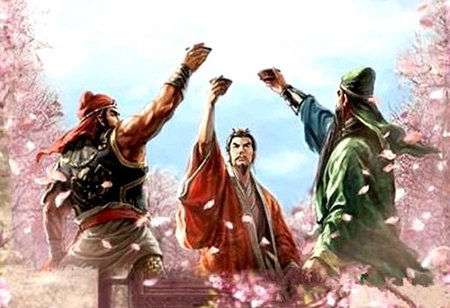
(ijxjj.com.)
When friends in ancient China swore to become brothers, they usually vowed, “We don’t expect to be born on the same day, but we seek to die on the same day (不求同年同月同日生,但求同年同月同日死).” Among all sworn brothers who ever took this oath, Liu Bei (刘备), Guan Yu (关羽) and Zhang Fei (张飞) in the Three Kingdom period (220 – 280) may be the most famous. The three met each other during the end of the Eastern Han dynasty (25 – 220), when China was war-stricken. Holding the same patriotic ambition, they swore brotherhood and promised to live and die together. In the later years, they joined in war and political competition. In both victory or defeat, they stood by each other as promised. When Liu Bei was officially proclaimed ruler of the Shu Kingdom in 221 CE, Guan and Zhang became his military generals. Afterward, Guan died in a battle against the Kingdom of Wu. Liu was furious and planned to crusade against Wu for revenge. But before they set out, Zhang was murdered by his subordinates. Soon after, during the Battle of Yiling (夷陵之战), Liu’s troops suffered heavy losses from the fire attack used by Wu, and Liu died from disease. Given that they died in such a short succession, perhaps it can be said that they kept their “die on the same day” pledge.
Friendship between Guan and Bao 管鲍之交
The idiom “friendship of Guan and Bao (管鲍之交 )” refers to great friends who know each other well and trust each other absolutely, was created after the names of Guan Zhong (管仲), a famous prime minister of the State of Qi in the Spring and Autumn period (770 – 476), and his close friends Bao Shuya (鲍叔牙). Guan came from a poor family. When he and Bao engaged in trade together, Guan invested less but took more dividends. People around Bao were very upset about this. But Bao said, “He did so because he is poor, not because he is greedy.” And when Guan failed again and again in various undertakings, Bao attributed them to unfavorable circumstances instead of Guan’s incompetence. Even when Guan, during a war, deserted the battlefield three times, with others considering him a coward, Bao reckoned that Guan had to survive the war to look after his aged mother, being a filial pious son.
Afterward, both Guan and Bao became statesmen for the State of Qi. Guan served Prince Jiu while Bao served Prince Xiaobai. These two princes fought for the throne, and Xiaobai won. Jiu was slain and Guan was imprisoned. But, when Bao was to be appointed as Prime Minister by the new king, he recommended Guan, who was still in prison, because he believed Guan had the ability to rule an empire. The ruler accepted the suggestion. After being appointed, Guan’s position was even higher than that of Bao. Due to Guan’s contribution, Qi conquered all the other states in the region in only seven years.
Guan always said, “It was my parents who gave life to me. It is Bao Shuya who really knows me (生我者父母,知我者鲍叔牙).”
Friendship across generations 忘年之交
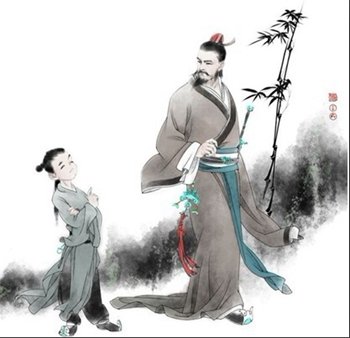
(mstxx.com.)
In ancient China, it was rare to see inter-generational friends, because according to Confucian culture, people had to respect seniority and treat elders in a humble and polite way. But it was a descendant of Confucius, Kong Rong (孔融), who became an exception. As a famed politician and scholar in the late Eastern Han dynasty, Kong Rong was famous for his arrogance and eccentric personality. But though he looked down on everyone, even the emperor, Kong Rong spoke highly of Mi Heng (祢衡), a 20-year-old scholar who was half his age. His wrote a recommendation letter for Mi Heng to Emperor Xian of Han, the contents of which have been passed down for thousands of years. Mi Heng, who also possessed a haughty and unbending character, admired Kong very much. He said Kong Rong was the “living Confucius.” In return, Kong Rong referred to Mi Heng as a “reborn Yan Hui”, who was Confucius’s favorite student and a well-known scholar.





